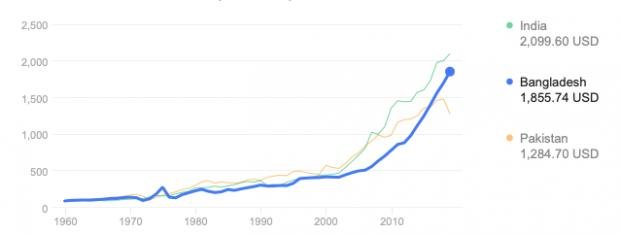Jaishankar's statement on FATF exposes 'true colours' of India: Pakistan
ISLAMABAD: The Foreign Office (FO) on Monday slammed India’s statement on the reasoning behind Pakistan remaining on the Financial Action Task Force (FATF), saying that it exposes the “true colours” of New Delhi and vindicates Islamabad’s stance.
“Indian statement not only exposes its true colors but also vindicates Pakistan’s longstanding stance on India’s negative role in FATF,” said FO Spokesperson Zahid Hafeez Chaudhri after Indian External Affairs Minister S Jaishankar admitted that Pakistan is on the FATF grey list because of the "efforts of Narendra Modi's government.".
The spokesperson reminded that Islamabad has always been highlighting India’s role to the international community in the politicisation of the FATF and undermining its processes. It added that the recent statement by the Indian foreign minister was “just a further corroboration of its continued efforts to use an important technical forum for its narrow political designs against Pakistan”.
“While Pakistan has been sincerely and constructively engaged with FATF during the implementation of the action plan, India has left no stone unturned in casting doubts on Pakistan’s progress through disgraceful means,” said the FO spokesperson.
The statement said that Islamabad has been “exposing India’s duplicitous role to the international community in the past” and vowed that it will also bring the “recent confession by India” to the FATF’s notice.
“Pakistan is also considering approaching FATF president for an appropriate action in this matter. Following the recent confession by Indian Government, India’s credentials for assessing Pakistan in FATF as co-chair of the Joint Group or for that matter any other country are subject to questions, which we urge FATF to look into,” said Chaudhri.
The FO spokesperson reiterated that Pakistan’s progress in AML/CFT domain has been “demonstrated through concrete, tangible and verifiable actions” which was also “openly acknowledged” by FATF.
“We are resolved to sustain this momentum and trajectory with the support and cooperation of our international partners. India’s delusions of putting pressure on Pakistan have always remained unfulfilled and would never see the light of day,” said Chaudhri. He also reaffirmed Pakistan’s commitment to the AML/CFT systems.
'India made sure Pakistan stays on FATF grey list'
On Sunday, Indian External Affairs Minister S Jaishankar admitted that Pakistan is on the grey list of the FATF because of the "efforts of Narendra Modi's government."
According to a report published by The Print, India's External Affairs Minister S Jaishankar credited the Modi-led government for its "efforts" to ensure that FATF kept Pakistan on the grey list.
The minister issued the statement while addressing BJP leaders’ training programme on the foreign policy of the government via video link, the outlet said.
“FATF as all of you know keep a check on fundings for terrorism and deals with black money supporting terrorism. Due to us, Pakistan is under the lens of FATF and it was kept [on] the grey list. We have been successful in pressurising Pakistan and the fact that Pakistan’s behaviour has changed is because of pressure put by India by various measures. Also terrorists from LeT and Jaish, India’s efforts through UN, have come under sanctions,” Jaishankar reportedly told the leaders, according to The Print.
It should be recalled that on June 25, the FATF had said that it recognises Pakistan's progress and efforts to address items in its country action plan that pertain to combating the financing of terrorism and has encouraged it to continue progress and address as soon as possible "the one remaining CFT-related item".
It had also handed the government six new anti-money laundering areas to work on.
Addressing a press conference after the June 21-25 plenary meeting concluded in Paris, FATF President Dr Marcus Pleyer had said that Pakistan remains under "increased monitoring".
"The Pakistani government has made substantial progress in making its counter-terrorist financing systems stronger and more effective. It has largely addressed 26 out of 27 items on the action plan it first committed to in June 2018," he said.
Dr Pleyer had said that the plan focused on terrorist financing issues.
He had said that the one key action item still needs to be completed "which concerns the investigation and prosecution of senior leaders and commanders of UN-designated terror groups".
The FATF president highlighted that Pakistan has "made improvements" after the Asia Pacific Group highlighted issues in 2019 during its assessment of Pakistan's entire anti-money laundering and counter-terrorist financing system.
"These include clear efforts to raise awareness in the private sector to Pakistan's money laundering risks and to develop and use financial intelligence to build a case.
"However Pakistan is still failing to effectively implement the global FATF standards across a number of areas. This means the risks of money laundering remain high which in turn can fuel corruption and organised crime."
https://www.geo.tv/latest/360750-indias-statement-on-fatf-exposes-true-colours-of-new-delhi-fo








 eaders from across the political spectrum on Monday lashed out at India for its admission that the Narendra Modi-led government had ensured Pakistan remained on the Financial Action Task Force (FATF) grey list.
eaders from across the political spectrum on Monday lashed out at India for its admission that the Narendra Modi-led government had ensured Pakistan remained on the Financial Action Task Force (FATF) grey list.